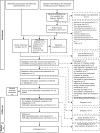Study protocol for a feasibility study of an internet-administered, guided, CBT-based, self-help intervention (ENGAGE) for parents of children previously treated for cancer
- PMID: 29903802
- PMCID: PMC6009624
- DOI: 10.1136/bmjopen-2018-023708
Study protocol for a feasibility study of an internet-administered, guided, CBT-based, self-help intervention (ENGAGE) for parents of children previously treated for cancer
Abstract
Introduction: A subgroup of parents of children previously treated for cancer report long-term psychological distress after end of treatment. However, needs for psychological support are commonly unmet and there is a lack of evidence-based treatments tailored to the specific needs of this population. An internet-administered, guided, cognitive-behavioural therapy-based, self-help intervention (ENGAGE) for parents of children previously treated for cancer may provide a solution. The aim is to examine the feasibility and acceptability of the intervention ENGAGE and the study procedures for a future controlled trial.
Methods and analysis: The study has an uncontrolled within-group design with an embedded qualitative and quantitative process evaluation. Potential participants are parents of children previously treated for cancer, living in Sweden, recruited via their child's personal identification number (via the Swedish Childhood Cancer Registry and the Swedish Tax Agency). Parents are invited randomly with information packs sent to home addresses. Further interest in participating can be registered via information on relevant websites. The study aims to recruit 50 parents who will receive the intervention ENGAGE which is designed to be delivered over a 10-week period, and comprises one introductory chapter followed by up to 10 intervention modules addressing key concerns identified for the population. Consistent with feasibility study objectives, primary outcomes relate to recruitment, attrition, data collection, study resources, intervention delivery and acceptability. Clinical outcomes (post-traumatic stress, depression, anxiety, fear of cancer recurrence, psychological inflexibility and experiential avoidance, depressed inactivity, fatigue, quality of life and self-compassion) will be measured at baseline, post-treatment (12 weeks) and 6-month follow-up.
Ethics and dissemination: The Regional Ethical Review Board in Uppsala, Sweden has granted approval for the study (Dnr: 2017/527). Results will be disseminated to relevant healthcare and patient communities, in peer-reviewed and popular science journals, and at scientific and clinical conferences.
Trial registration number: ISRCTN57233429; Pre-results.
Keywords: anxiety; clinical trial; depression; eHealth; parents.
© Article author(s) (or their employer(s) unless otherwise stated in the text of the article) 2018. All rights reserved. No commercial use is permitted unless otherwise expressly granted.
Conflict of interest statement
Competing interests: None declared.
Figures
Similar articles
-
Engagement With an Internet-Administered, Guided, Low-Intensity Cognitive Behavioral Therapy Intervention for Parents of Children Treated for Cancer: Analysis of Log-Data From the ENGAGE Feasibility Trial.JMIR Form Res. 2025 Jan 28;9:e67171. doi: 10.2196/67171. JMIR Form Res. 2025. PMID: 39874575 Free PMC article.
-
Guided internet-administered self-help to reduce symptoms of anxiety and depression among adolescents and young adults diagnosed with cancer during adolescence (U-CARE: YoungCan): a study protocol for a feasibility trial.BMJ Open. 2017 Jan 27;7(1):e013906. doi: 10.1136/bmjopen-2016-013906. BMJ Open. 2017. PMID: 28132011 Free PMC article.
-
Opt-out rates and reasons for non-participation in a single-arm feasibility trial (ENGAGE) of a guided internet-administered CBT-based intervention for parents of children treated for cancer: a nested cross-sectional survey.BMJ Open. 2022 Apr 1;12(4):e056758. doi: 10.1136/bmjopen-2021-056758. BMJ Open. 2022. PMID: 35365530 Free PMC article. Clinical Trial.
-
Involving parents of children treated for cancer in Sweden as public contributors to inform the design and conduct of an evaluation of internet-administered self-help for parents of children treated for cancer: a protocol.Res Involv Engagem. 2024 Jan 2;10(1):2. doi: 10.1186/s40900-023-00532-4. Res Involv Engagem. 2024. PMID: 38167254 Free PMC article. Review.
-
Efficacy of computer- and/or internet-based cognitive-behavioral guided self-management for depression in adults: a systematic review and meta-analysis of randomized controlled trials.BMC Psychiatry. 2022 Nov 24;22(1):730. doi: 10.1186/s12888-022-04325-z. BMC Psychiatry. 2022. PMID: 36424570 Free PMC article.
Cited by
-
Consolidated guidance for behavioral intervention pilot and feasibility studies.Pilot Feasibility Stud. 2024 Apr 6;10(1):57. doi: 10.1186/s40814-024-01485-5. Pilot Feasibility Stud. 2024. PMID: 38582840 Free PMC article.
-
Engagement With an Internet-Administered, Guided, Low-Intensity Cognitive Behavioral Therapy Intervention for Parents of Children Treated for Cancer: Analysis of Log-Data From the ENGAGE Feasibility Trial.JMIR Form Res. 2025 Jan 28;9:e67171. doi: 10.2196/67171. JMIR Form Res. 2025. PMID: 39874575 Free PMC article.
-
Expert Perspectives on Pilot and Feasibility Studies: A Delphi Study and Consolidation of Considerations for Behavioral Interventions.Res Sq [Preprint]. 2023 Dec 15:rs.3.rs-3370077. doi: 10.21203/rs.3.rs-3370077/v1. Res Sq. 2023. Update in: Pilot Feasibility Stud. 2024 Apr 6;10(1):57. doi: 10.1186/s40814-024-01485-5. PMID: 38168263 Free PMC article. Updated. Preprint.
-
Study within a trial (SWAT) protocol. Investigating the effect of personalised versus non-personalised study invitations on recruitment: An embedded randomised controlled recruitment trial.Contemp Clin Trials Commun. 2020 Apr 24;18:100572. doi: 10.1016/j.conctc.2020.100572. eCollection 2020 Jun. Contemp Clin Trials Commun. 2020. PMID: 32420511 Free PMC article.
-
Application and Mechanisms of Internet-Based Cognitive Behavioral Therapy (iCBT) in Improving Psychological State in Cancer Patients.J Cancer. 2023 Jul 3;14(11):1981-2000. doi: 10.7150/jca.82632. eCollection 2023. J Cancer. 2023. PMID: 37497400 Free PMC article. Review.
References
-
- Gustafsson G, Kogner P, Heyman M. Childhood cancer incidence and survival in Sweden 1984-2010. Swedish Childhood Cancer Registry. 2013. http://www.forskasverige.se/wp-content/uploads/ChildhoodCancerIncidencea... (accessed 9 Nov 2017).
Publication types
MeSH terms
Associated data
LinkOut - more resources
Full Text Sources
Other Literature Sources

